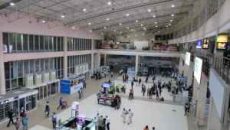Through aggressive and constructive policies, the quality of education in the FCT has increased by 300 per cent in the past three years
Shortly after Bala Mohammed was appointed Minister of the Federal Capital Territory, FCT, by President Goodluck Jonathan, there was a damning UNESCO report in 2011 that an estimated 10.5 million school age children were out of school across Nigeria. With Abuja’s population growth rate of 3.5 per cent annually, it substantially increased the challenges of education administration in the FCT and the education statistics were indeed dismal. Terminal education pass rate in the territory stagnated at 10 per cent in 2011. This was critical for pupils aspiring to higher institution. While some of the students in senior secondary schools could pass other subjects, it was discovered that grades in critical subjects like English Language and Mathematics were low. Consequently students from such schools are often denied admission into institutions of higher learning. The classrooms were congested with pupils and the sitting arrangement was horrible.
“We had a situation where our children did not have where to sit,” recalled Kabir Usman, FCT Education Secretary. There were not enough teachers, especially in English Language and Mathematics, in the public schools. The odds were daunting enough. But with Mohammed’s passion for education, he set out to ensure quality education in FCT. “We concentrated on access and quality,” explained Usman.
Between 2011 and the end of 2013, the FCT administration had succeeded in building an estimated 1,800 classrooms to accommodate nearly 8,500 pupils. Within the same period, the FCT administration established 40 new schools. Likewise, 1,575 sets of furniture were supplied to primary, junior and senior secondary schools for use in the classrooms. To enhance quality of science education, 14 science laboratories were built to complement teaching. Not only that. An additional 12 new libraries were built and over 1.2 million sets of books were provided for students at no charge. All the libraries were furnished and equipped with latest equipment needed for learning.
These improvements dramatically increased school enrolment. For instance, in Early Child Care Centres, ECCC, which is the pre-primary school meant to groom young pupils not yet of school age, enrolment increased by 40.75 per cent in the last two years; while in primary school, enrolment increased by 14.5 per cent. At the Junior Secondary School, JSS, level it increased by 16.7 per cent; while at the Senior Secondary School, SSS, level there was an increase of 13.1 per cent.
This radical improvement in public schools would not have been possible without a corresponding increase in the number and quality of teachers and also in the improvement in quality of instructional materials. The FCT administration did not only recruit more teachers, it paid particular attention to teachers handling core subjects like English Language and Mathematics.
Out of the 2,500 teachers employed, 1,700 were expressly for basic education, while 800 were for senior secondary schools. The 800 teachers were mostly hired for the core subject areas. The Education Secretariat did not stop at that, it went ahead to ensure improvement in the quality of teaching in public schools. In the last two years a lot of retraining exercise has been done in the FCT like it has never been done before. “We needed to train and retrain them,” explained Usman.
So in the years under review, 2,500 teachers were exposed to ICT training. About 4,500 teachers took part in capacity building workshop in different areas. In conjunction with the National Mathematical Centre, 1,200 teachers were trained on different concepts in the subject. “Students find it difficult to pass Mathematics. Sometimes, the problems lie with the teachers’ inability to teach the subject,” explained Usman.
Similarly, the Secondary Education Board, SEB, completed capacity building workshop for over 230 Trade Subjects Teachers, TST, for the newly introduced trade subjects like Computer Science. Also in collaboration with the Nigeria Society of Engineers, NSE, Universal Basic Education Board, UBEB, trained 20 female teachers drawn from schools within the Abuja Municipal Area Council, AMAC, on Basic Computer Operation and facilitated the training of 200 principals, teachers and quality assurance officers at the National Institute of Educational Planning and Administration, NIEPA. In addition, Agency for Mass Education, AME, in Abuja, in collaboration with UNESCO, trained 111 facilitators on revitalising adult and youth literacy.
Realising that public schools account for about just two out of every five schools in the FCT, the administration took its reforms to the private schools as well. According to Usman, the immediate challenge was the need to ensure that pupils learn in a conducive environment. To this end, Department of Policy and Implementation, DPI, the quality assurance arm of the Secretariat that supervises the operations of private schools and carries out public school inspections, was mobilised to ensure that all schools within the FCT meet the required minimum standards.
In 2013, the DPI did an audit of schools. This showed that a total of 915 private schools were accredited; there was a total of 12,097 teachers and a total of 82,918 pupils and students. The DPI also in the course of its campaign was charged to strictly monitor the discipline policy for FCT schools and provide guidelines on Adult Non-Formal Education Centres. By the end of its exercise last year, the agency further accredited a total of 384 private schools while it has concluded arrangements to shut down over 150 private schools that are substandard and operating illegally.
In no time, residents began to see the impact of these aggressive campaigns in education in the quality of learning in schools. From the 2011 ten per cent pass rate in schools, the FCT moved on to 26 per cent in the rate of students that passed terminal exams in just public schools. In 2013, there was a further improvement as the pass rate moved from that 26 per cent to 39 per cent, showing a 290 per cent improvement on the 2011 figure.
The accomplishments of Senator Mohammed in the education sector would not be completed without the mention of his activities in the tertiary education. The FCT College of Education, CoE, Zuba, is currently the only tertiary education institution under the purview of the Education Secretariat although efforts towards the establishment of the Abuja University of Technology, Abaji, AUTA, has reached advanced stage. It is authoritatively gathered that the institution will take off very soon. The enabling law of CoE, Zuba, through the concerted efforts of the minister has been passed by the National Assembly thereby giving the college the legal backing to award certificates and also perform its other statutory functions. The college also held its maiden convocation ceremony on the 21st of September 2013 when it graduated a total of 4,549 students and conferred fellowships on two eminent Nigerians: Lt. Gen. J. T. Useni, who established the CoE in 1997, and Dr. Aliyu Modibbo Umar, a former FCT minister, for his outstanding contributions to the development of the College. The institution has also attained accreditation of all its NCE courses.
Put together, with a 300 per cent improvement in the quality of education in the FCT in just three years Mohammed is a beacon of light in Nigeria’s embattled education sector and a credit to President Jonathan’s Transformation Agenda.
Follow Us on Social Media





 WhatsApp us
WhatsApp us